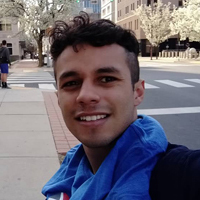Part 1
by Javier Márquez
Editor’s Note: The Comunidad Anabautista de Medellín was a recipient of a Mosaic Conference church planting grant in 2024 and 2025.
From April 15 to 17, Mosaic staff members Marco Güete and Noel Santiago and I visited Comunidad Anabautista de Medellín (Anabaptist Community of Medellín), where leaders Carlos Sánchez and Nidia Montoya welcomed us and guided us on a tour to learn about their ministry.
We have prepared a short report complete with photos so that the Conference and its churches can learn about this wonderful ministry.
It is called “In Jesus’ Sandals” because our time there was full of tours and visits, allowing us to get to know the immense Colombian city and visit the living rooms of the families that are part of the church—a total of 40 homes.
Although we did not have time to visit all of them, we managed to meet and talk with many families and have a very special time.



First, we took a cable car over the neighborhoods of Medellín’s Commune 13, until we arrived at the Margaritas station in the Robledo sector. There, Carlos asked us to wait while he went to get bread and milk that we would distribute on each of the visits. The agenda noted 14 visits, and the path between the neighborhoods was long and tedious, going up and down stairs, crossing small streams that ran through the mountain, walking through blocks and hills until reaching each of the houses.


For each visit, Carlos not only buys bread and milk, but also prepares a biblical reflection that he shares with the families. When he arrives in each sector of the city, he meets with members from the church who live in the area and are community leaders. They help him arrange the visits.
Whenever we arrived at a house, the residents welcomed us with love and joy. They prepared for the visit by making coffee or fruit juice, and brought out their best chairs, placing them in their small rooms so that we could sit. When there weren’t enough chairs, they improvised seats by placing buckets upside down, so that we could all be seated.
Each house was very humble, and on each wall were traces of people’s lives: portraits, gifts, souvenirs, paintings and posters, all with meaning. The houses also had display cases with products for sale, sometimes homemade ice cream or clothes for resale. These are families that struggle each day to earn a living.
At the time of prayer, there are common requests: for someone’s health, a job, for God’s care, and above all, for protection from the gangs and criminal groups.




Carlos’ Biblical reflections are usually deep and full of testimonies. For these visits, Carlos prepared the text of Matthew 5:9: “Blessed are the peacemakers, for they will be called children of God.”
In each family’s house Carlos has a story, something to remember, and a word of encouragement to share. He knows all the people he visits very well and has known them for a long time, but the community continues to grow because many families invite someone new to participate in the visits. When we leave, Carlos shares the bread and milk with them.
In this way we went from house to house through the different sectors of the city: from north to south, east to west. Carlos explained to us the context of Medellín, the situation of the city and the specific situations of the families. They are almost always families surrounded by crime, war, hunger, lack of job opportunities, and discrimination.
A second article will follow, to share more of this incredible experience.

Javier Márquez
Javier Márquez is an Anabaptist Colombian pacifist and poet and a writer for the MCUSA publication MenoTicias.
The opinions expressed in articles posted on Mosaic’s website are those of the author and may not reflect the official policy of Mosaic Conference. Mosaic is a large conference, crossing ethnicities, geographies, generations, theologies, and politics. Each person can only speak for themselves; no one can represent “the conference.” May God give us the grace to hear what the Spirit is speaking to us through people with whom we disagree and the humility and courage to love one another even when those disagreements can’t be bridged.
This post is also available in: Español (Spanish) Indonesia (Indonesian)
This post is also available in: Español (Spanish) Indonesia (Indonesian)
